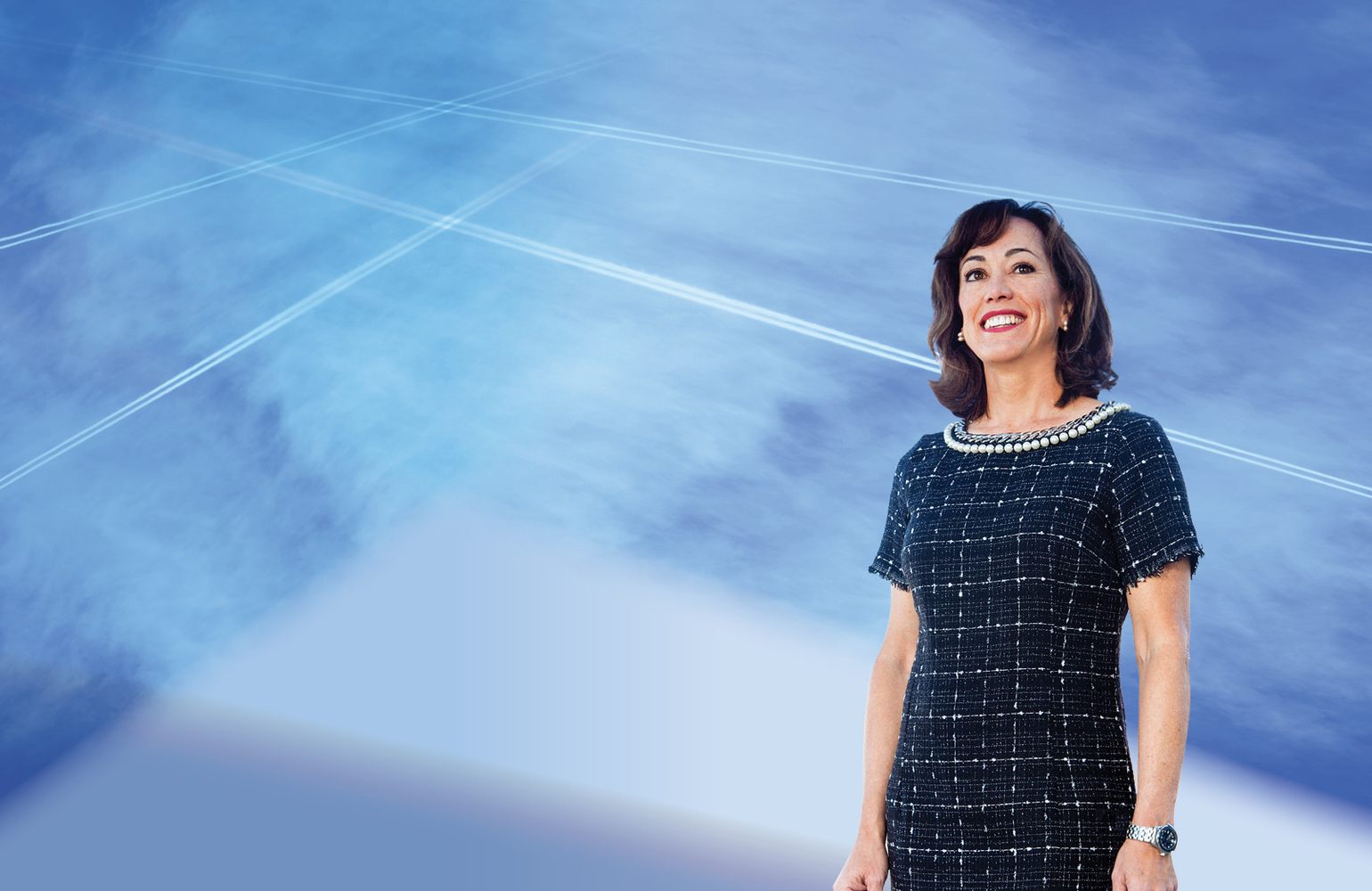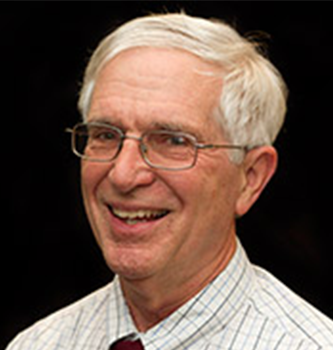Taking flight
President Janine Davidson is ready to pilot MSU Denver to new heights.

Janine Davidson knew she wanted to fly. She fell in love with planes as a preteen living on an air base in Virginia Beach, where her father, a U.S. Navy admiral, was stationed. She and her brother would bike to the airstrip to watch fighter planes take off.
“It sounds ridiculous because this would never happen today, but we’d ride right onto the flight line and knock on the door of the tower,” she recalls. “They would let us up, and we’d talk on the radio. We’d say things like ‘clear to land’ or ‘clear to take off.’”
Despite feeling called to fly, her dream of being a pilot almost didn’t get off the ground.
As a senior in high school, Davidson interviewed for the Navy ROTC. She hoped the interview would earn her a scholarship to college and a career flying F-14s.
When the officer asked what she wanted to do in the Navy, she told him as much.
He replied: “They don’t let girls fly fighter planes.”
No one had told her that, so she said what any “sassy” 17-year-old would say: “That’s the stupidest thing I’ve ever heard.”
Needless to say, she did not earn a Navy ROTC scholarship. But that “failure,” as she describes it, did lead her in a different – and more auspicious – direction.
At her father’s suggestion, she applied for an Air Force ROTC scholarship instead. She earned a full ride to college at the University of Colorado Boulder, which she could not have afforded otherwise.
There, Davidson met her mentor, Col. Robert Mock, who headed up the ROTC program. Mock would later teach aviation at MSU Denver, eventually becoming dean, and was so beloved that the University named its flight-training facility in his honor – the MSU Denver Robert K. Mock World Indoor Airport.
Mock supported Davidson’s dream every step of the way.
“He really pushed me and another woman who wanted to be a pilot forward,” Davidson says. “It wasn’t until years later that I realized he caught a lot of grief from his colleagues for supporting us. I honestly feel like if I had gone someplace else, where I didn’t have a guy like him, I may not have ever gotten into pilot training.”

But she did get into pilot training, one of only about 20 women in the country selected for the program, the first leg of a journey that would lead her to be the first woman to fly a C-130 plane. She would go on to get her doctoral degree in international studies and later, as a civilian, hold multiple leadership positions in the Pentagon, the most recent of which was – in something of an ironic twist – undersecretary of the U.S. Navy.
Since July 24, she’s taken to piloting a different kind of plane as the ninth president of MSU Denver.
“Every day I wake up and come in here, and I realize this was definitely the right choice for me,” she says. “The mission of this University is so compelling and the people are compassionate, and that, to me, is really 90 percent of why you’d want to get up in the morning.”
Flight Path
Davidson strode across the stage of the King Center Concert Hall, sporting a Roadrunner-red dress and the smile of someone who was exactly where she was meant to be.
This was Sept. 13, her first major address to the University.
She stepped up to the podium, took a breath and launched into her speech, laying out her vision for the future of the institution.
A few minutes into the address, two things had become clear. First, Davidson is funny. She peppered her talk with humorous asides and showed a natural sense of comic timing. And second, there would be no question about the focus of her presidency.
“My top three priorities are students, students and students,” she said to the packed house, a line that drew plenty of laughs but also underscored the central theme of her vision: student success. In particular, she emphasized the importance of ensuring that all students have access to upward mobility through higher education – in short, the American dream.
“We are a university that doesn’t define itself by who we exclude but by who we include,” she said. “This is one of the most important roles higher education has played in our nation … but it is getting harder and harder. Despite the challenges to affordability, MSU Denver should be the model for how to keep this dream alive.”
Davidson’s vision comprised five focus areas. Two directly addressed student outcomes: strengthening the systems that help students graduate and delivering on the promise of preparing students for fulfilling and lucrative work after college.
The other three areas aim to improve the University’s processes to better serve students while also making the institution a top place to work in Colorado.
She said a top priority would be to tackle shrinking resources by building on this year’s record-breaking fundraising numbers and also through the development of additional public-private partnerships. She also spoke about investing in people through better employee engagement and compensation as well as her aim to lead with inclusivity and intention.

To take a deeper look at the focus areas, Davidson announced plans for the creation of six new issue-oriented councils to examine challenges and provide recommendations to the President’s Cabinet. These councils will include members from across the University and look at things such as strategy, processes and culture.
With this work, Davidson believes MSU Denver can become “a model urban university for opportunity, diversity, excellence and transformation.”
The core of her vision was shaped by several months of listening sessions with the campus community and external stakeholders. Besides meeting face-to-face with a variety of constituents, Davidson organized an anonymous online survey, which received nearly 2,000 submissions.
During her listening tour, Davidson learned a lot about the characteristics that make MSU Denver graduates unique and that employers have come to expect from the University’s alumni. She shared the five traits she heard most often: tenacious, diverse, primed, purposeful and entrepreneurial, which she coined the “Roadrunner Difference.”
“I am committed to ensuring the Roadrunner Difference endures,” she said, “that we continue to deliver high-quality education at an affordable price to as many would-be Roadrunners who want to take this journey.”
Top gun
Some careers run in families: teachers, doctors, business owners.
Davidson likes to joke that her family’s business is leadership. Her father was an admiral in the Navy. Her uncle ran a nonprofit. The list goes on.
By way of explanation, she shares a story from seventh grade. Her school principal announced that there would be elections for leaders of her class. The principal said there was no pressure to run since in every situation there are leaders and followers.
She recounted this to her father after school, and he responded, “No way. You’re not a follower.”
She thought her father was being unreasonable and tried to explain again what the principal said. But her father was adamant that she run.
And she did.
“I ran for secretary but didn’t win,” she says with a laugh. “But that was the expectation.”
Clearly, the lesson sank in.
Davidson has extensive experience leading complex organizations. Most recently, she served as the 32nd undersecretary of the Navy, managing all Department of the Navy affairs, including Navy and Marine Corps integration, acquisition, finance, personnel, legislative affairs, research and development. In that role, she was responsible for the health and well-being of nearly 900,000 sailors, Marines, civilians and their families.
Davidson also has nearly 30 years of experience in military operations, national-security policy and academic research. As an analyst and academic, she was a senior fellow for defense policy at the Council on Foreign Relations, where she is a lifetime member. She has taught national-security policy and political science at Georgetown University, George Mason University and Davidson College.
You may have even seen her on cable news programs, where she periodically served as a national-security expert.
It’s this unusual combination of skills that propelled her into the role of president at MSU Denver, not one she necessarily imagined for herself during those early years, when her primary focus was on flying.
“I don’t think a lot of kids imagine themselves as university presidents,” she says. “But all joking aside, the vast majority of people, people who I interviewed when I was trying to figure out what to do with my life, people who are happy and also successful, almost always say, ‘I never thought I’d be doing this.’ So how does that happen? I never thought I’d be a university president. Turns out, it’s awesome.”
Her own “zigzagging” path is one of the ways she feels kinship with MSU Denver students. She also understands what it feels like to be underestimated for reasons outside of her control.
She says that regardless of where students come from, she wants them to know that MSU Denver is a place where they can feel a sense of belonging. That support can be the foundation that enables them to finish their degrees.
“We need to graduate more of our students because clearly, our students who do graduate do very well,” she says. “So, we need to make sure all barriers to graduating are removed, whether it’s financial or emotional or anything else, and that’s why we’re focused so much on student success. I want to put out as many Roadrunners into Denver and beyond as we can. I want to see them take flight.”



